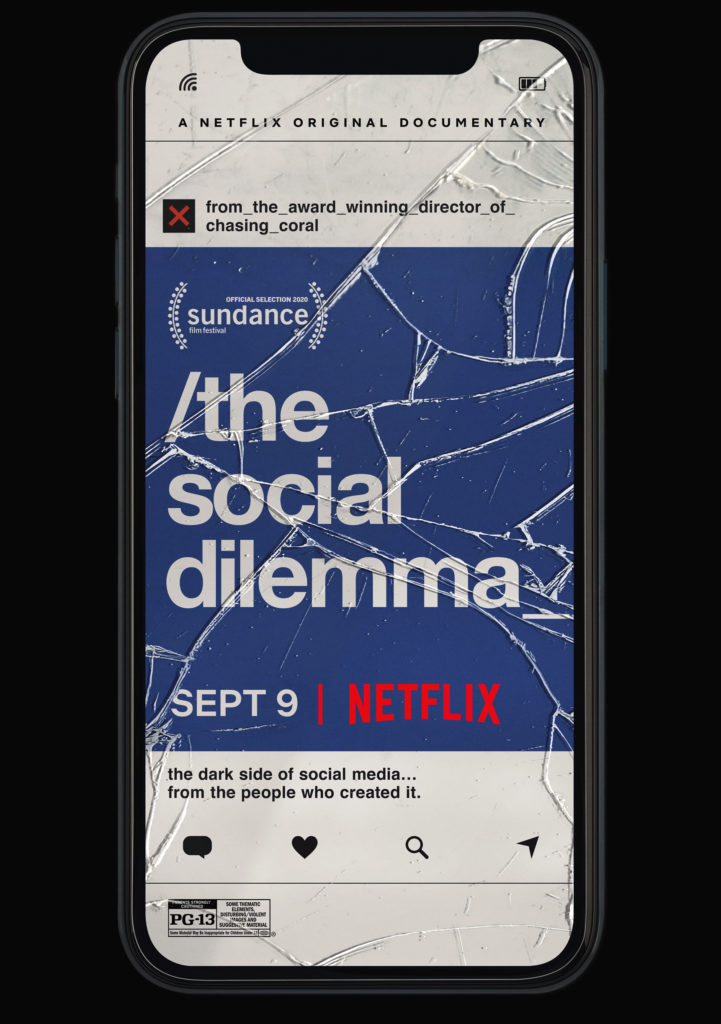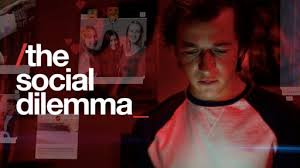“The Social Dilemma”– Addiction or Threat?

This is a Netflix docudrama not to be missed. The Social Dilemma, a granular investigation of the rise of social media and the ongoing damage it is causing to segments of society around the globe, is chilling. Focusing on exploitation of Internet users, The Social Dilemma, produced by Jeff Orlowski, reveals how most users are oblivious about how their surfing patterns have been monetized. We are all highly valuable assets being sold for financial gain. The user ‘s data is sold to advertisers through embedded algorithms. The advertisers are the real customers of the social media giants. Just follow the money. Do we pay to use Facebook? Who does?
The business model has been designed to create an addiction: from maintaining “eyeballs” from the three bouncing balls the user sees while waiting for an incoming text to the “Like” and “hearts” buttons which cause warm feelings validating the individual’s status and self-worth. The content associated with the eyeballs (or “traction”) is then catalogued according to preferences, biases, and behavioral patterns to enable efficient data-mining. Throughout The Social Dilemma, a teenager’s social-media addiction is dramatized with actors playing the roles of the naive young users being controlled by powerful algorithms structured by artificial intelligence. The teenagers don’t stand a chance of ever detoxing.
That social media can be addictive and threatening isn’t news to anyone who uses Facebook, Twitter, Instagram and LinkedIn (Isn’t that most of us?). But the most disturbing and pernicious aspect of Jeff Orlowski’s documentary is that the system is designed structurally to gather BigBrother information for profit. That is the business model.

An advertising mecca results. In the hands of companies like Facebook and Twitter, the ads can be tailored to the potential customer’s taste. Social media platforms’ use in politics, their effect on mental health and their role in spreading conspiracy theories can and has undermined the stability of communities.
With Machiavellian precision, the psychology of social media is at the cellular level. Users want to be with the same tribe (blocking those who disagree), because that is a primordial imperative for survival. Infinite scrolling and push notifications designed to feed information that the users want to believe keeps us constantly addicted. And this personalized “data” not just predicts but influences our actions. Our world is thus re-created by the clickbait the largest social media companies predict we’re most comfortable seeing. This is confirmation bias at its most extreme. Advertisers and political propagandists are delivered the prey they earnestly seek with increasing accuracy.
To turn social media into some sort of Frankenstein for the digital age is too simplistic. Social media can be an incredibly valuable tool for fact-finding, for mobilization of people’s good will and for efficient dissemination of news. However, what is dangerous in The Social Dilemma is how the tech experts (who were instrumental in developing the algorithms for Facebook, Twitter, and Instagram) are themselves deeply alarmed by how positive social changes can suddenly and dramatically be hijacked, morphing into changes that are nefarious and incendiary.
Similar to how television was eventually regulated for its intrusion upon children’s minds for commercial success, The Social Dilemma raises the question: what can be done now that the genie is out of the bottle? One answer proposed is that user information be treated as a taxable asset. Undoubtedly tech companies would pass on the cost of the taxes causing advertisers to buy less.. Congress is now holding hearings on the monopolistic nature of the mega social media corporations, but The Social Dilemma hovers more closely to the specter of human engineering in the hands of potentially ruthless agents. Compliance and regulation are long overdue.
Truly eye-opening and disturbing.
Availability: The Social Dilemma premiered at the 2020 Sundance Film Festival and was released on Netflix on September 9, 2020.
